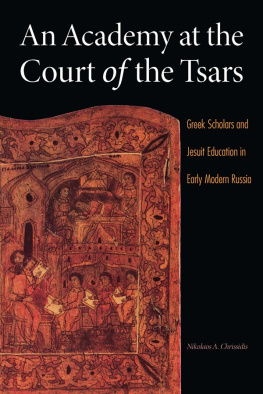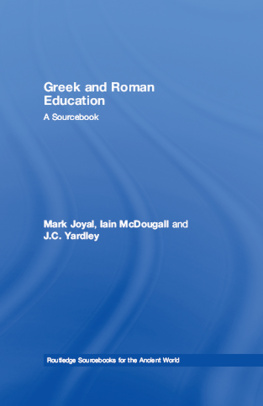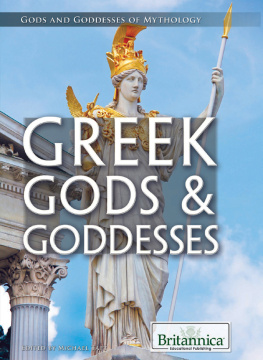Northern Illinois University Press, DeKalb 60115
2016 by Northern Illinois University Press
All rights reserved
Printed in the United States of America
25 24 23 22 21 20 19 18 17 16 1 2 3 4 5
978-0-87580-729-4 (paper)
978-1-60909-189-7 (e-book)
Book and cover design by Shaun Allshouse
Library of Congress Cataloging-in-Publication Data
Names: Chrissidis, Nikolaos A., author.
Title: An academy at the court of the tsars : Greek scholars and Jesuit education in early modern Russia / Nikolaos Chrissidis.
Description: First edition. | DeKalb, IL : NIU Press, [2016] | Includes bibliographical references and index.
Identifiers: LCCN 2015039120 | ISBN 9780875807294 (paperback : alkaline paper) | ISBN 9781609091897 (e-book)
Subjects: LCSH: Education, HigherRussiaMoscowHistory17th century. | Moskovska

slav

no-greko-latinska

akademi

History. | GreeksRussiaMoscowHistory17th century. | Leichouds, Iannikios, 16331717. | Leichouds, Sphronios, 16521730. | JesuitsEducationRussiaHistory17th century.
Classification: LCC LA839.5.M68 C47 2015 | DDC 378.47/3109032dc23
LC record available at http://lccn.loc.gov/2015039120
Note on Transliteration and Dates
All dates are given according to the Julian calendar that was in use in Russia and the Greek world during the period covered in this book. The Julian calendar trailed the Gregorian by ten days in the seventeenth century and eleven days in the eighteenth century.
In transliterating Greek and Russian names and terms, I follow the Library of Congress system with some modifications. Thus, the ancient Greek beta () is transliterated as b, or in the case of Modern Greek as v. I have not, however, used the macron sign: thus, the Greek letters epsilon () and eta () are uniformly rendered as e; likewise, omega () and omicron () are rendered o. In the case of Russian words, I have striven for uniformity, except for names and terms known commonly in their anglicized form. Thus, Peter the Great and Moscow, but Aleksei Mikhailovich and Kazan.
References to Slavonic/Russian manuscript sources are according to the following format: f., op., d., and no. (or kn.). That is, f. for fond (fund), op. for opis (register), d. for delo (file, unit), and no. for the number of the manuscript in the register (or kn. for kniga, or a particular book if the source is divided into books as is the case with ambassadorial records). I cite manuscripts by l. (list) or ll. (listy), that is, folio or folios. Thus, l. 3 means folio 3, and ll. 4-4ob. represents folios 4-4v (with ob. referring to oborot, meaning verso). When a manuscript has an original pagination in pages, I follow its lead and cite it by pages rather than listy. Greek manuscripts are referred to by folio or pages.
Acknowledgments
During the long process of tracking the deeds of the two Kephallenians who are center stage in this book, I have accumulated numerous debts to institutions and individuals. It is with gratitude that I hereby acknowledge their assistance and contributions.
In Russia, among those who welcomed warmly the Likhudist from the USA were the directors and staffs of the Russian State Library and the Russian State Archive of Ancient Documents in Moscow, of the Russian National Library and of the Library of the Academy of Sciences in Saint Petersburg, and of the Vladimir-Suzdal Museum-Preserve in Vladimir; and in Ukraine, the staff of the Institute of Manuscripts in the V. I. Vernadsky National Library of Ukraine, in Kiev. I am grateful for their generous help in unearthing manuscripts, acquiring microfilms and digital copies, and providing innumerable other services that rendered my research peregrinations productive. In New Haven, the staff of Yales Sterling Memorial Library, especially of the Circulation Desk and of the Slavic Reading Room, have offered invaluable assistance for many years. In particular, I am grateful to the long-time curator of Sterlings Slavic Collection, Tatjana Lorkovic, for facilitating my work both in New Haven and in Russia in numerous ways. I am also indebted to Patricia Thurston, catalogue librarian at Sterling Memorial Library, for responding promptly to my many requests for help with hard-to-find titles.
Yale University provided an intellectually challenging environment and offered generous financial assistance. The Yale Center for International and Area Studies, the Yale-Moscow State University Exchange Program, the International Security Studies Program, the Deans Office and, last but not least, the Department of History all financed parts of the research and writing of the dissertation upon which this book is based. The Fulbright Foundation in Greece, the Woodrow Wilson National Fellowship Foundation, and the Spencer Foundation for Research in Education provided fellowships that were crucial for the beginning and completion of the dissertation. A Hannah Seeger Davis Post-Doctoral Fellowship at the Program in Hellenic Studies, Princeton University, transported me into the midst of the welcoming family of the Princeton Hellenists (both local and transient), reconnected me to Greek scholarship and, crucially, gave me the opportunity to make several scholarly contacts and acquire new good friends. I am grateful to Princetons indefatigable Dimitri Gondicas, and to the ever-helpful Alexander Nehamas and Carol Oberto for their support. Much later, a Faculty Research Fellowship from the National Endowment for the Humanities, a Sabbatical Fellowship from the American Philosophical Society, and a Cotsen Traveling Fellowship from the Gennadius Library funded a leave of absence and research trips that substantially enhanced the resulting books purview. Over the years, several Connecticut State University Faculty Research Grants have undergirded research trips to Russia, Greece, and Ukraine. Finally, a special thanks is due to the oasis of scholarly engagement that is the Gennadius Library of the American School of Classical Studies in Athens, Greece. Dr. Maria Georgopoulou, the Director of the Gennadius Library; Natalia Vogeikoff-Brogan, the Doreen Canaday Spitzer Archivist; Irini Solomonidi, the Senior Librarian; and the superb team of specialists and staff, including Aliki Asvesta, Leda Costaki, Eleftheria Daleziou, Soula Panagopoulou, Katerina Papatheophani, Mina Rodi, Andreas Sideris, Maria Smali, Giannis Valourdos, Gavriella Vasdeki, and Demetres Velentzas, have for many years provided an intellectually nurturing and socially welcoming environment for my research forays. Truly, it was at the Gennadius Library that this book took its final shape. It is with great pleasure and a sense of heavy responsibility that I acknowledge the assistance and support of all of the aforementioned institutions and individuals.
Over many years, several scholars and friends facilitated my scholarly endeavors in multiple ways. In Russia, Aleksandr Iurevich Babosov, Evgeniia Mikhailovna Bykova, Olga Vladimirovna Dmitrieva, and Olga Igorevna Variash offered generous advice, active encouragement, vital information, and lively company, often reminding me that v Gretsii vse est. In New Haven, Christos Cabolis, Katerina Cabolis, Petros Cabolis, Maria Georgopoulou, Dimitri and Ioanna Gutas, Maija Jansson, and Ulla Kasten for many years served as my surrogate family, took care of me in bad times, and offered much needed support. Alexandra and Harry Korros provided me with yet another caring family in the heady early years of my sojourn in the USA. Zoe Diamadi, Firoozeh Kashani-Sabet, Jennifer Spock, Michele Thompson, and Sarah Trapnell served as mainstays during difficult times. In Greece, Virginia Giantze, Vaso Tsimpouke, Roxane Caftantzoglou, Dimitris Chrysis, Gelina Harlaftis, Eva Kalpourtze, Nausika Litsardopoulou, Evrydiki Sifnaiou, and again Christos Cabolis and Maria Georgopoulou, have taken care of me in more ways than I can express. I am deeply grateful for the generosity, warmth, and help of them all. At my own institution, Southern Connecticut State University, I have been blessed with several colleagues-cum-scholars who over the years have served as sounding boards for things familiar and unfamiliar and who have been unstinting in their support: Poly Beals, Steve Judd, Marianne Kennedy, Virginia Metaxas, Troy Paddock, Christine Petto, Michele Thompson, and Bogdan Zamfir. I am also very thankful to Shirley Cavanagh, Beth Paris, and Alba Reynaga of Buley Library at Southern Connecticut State University, who have repeatedly responded with swift and collegial service when faced with my innumerable requests for books, and to the Provosts Office for partially funding the indexs preparation. At the Hiillwood Estate, Marge Huang and Kristen Regina were instrumental in securing images and permission to use them, for which I am grateful.







 slav
slav